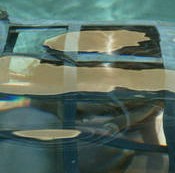Existence equals copula plus substance.
Existence requires an architecture, a structure of interrelations which informs itself and is what we term 'meaning.' Language is made up of vocabulary, a lexical base composed of different words each of which has a "proper" meaning attached to it. However, it does not function, that is it does not speak and produce phrases, unless the words are assembled in a series put together around some verb form. Verbs allow the discursive string (the unidimensionally linear) to turn over, or around, or back on itself and so occupy some kind of multidimensional space. It is the creation of this opening that allows for the possibility of meaningful utterance. In this way, language is a reality parallel to the physical and the conscious (Dasein). The significance of its structure comes into being through the verb; the connecting-relating element which brings it from one dimension into the realm of another. The copula allows existence to appear...to be self-evident. Copula and existence are one and the same. The verb that is always at the base of meaning is that of existence: “to be.” All verbs around which words are assembled to say something about each other are derived from the base verb “to be.” The verb is the indispensable condition of all discourse and the entire verbal species can be reduced to the single one that signifies: “to be.” In reality, there is only one verb, the verb “to be,” compounded, for all other verb forms, with attributes:
. . . . . . . . . . . . . . . . . I sing = I am + singing.[1]
The verb “to be,” like lone existence, is without determinable meaning . . . its role is the syntactical function which allows other words to relate to each other, it functions as the threshold of meaning and allows language to function. From another perspective, the function of “to be” is manifest as the re-presentational component of language. The operation which turns the discursive string back around on itself is the same as that through which language re-presents reality . . . it functions as the multidimensional linguistic space paralleling the multidimensional space in which reality decomposes itself and allows the appearance of difference. Both “spaces” allow for the most basic requirement of meaning: difference and interrelation within limitation. In conjunction with the lexical aspect (including verbal attributes) of language, the copula “to be” becomes substantive . . . the horizon of meaning.
[1] This sample comes from Michel Foucault.
. . . . . . . . . . . . . . . . . I sing = I am + singing.[1]
The verb “to be,” like lone existence, is without determinable meaning . . . its role is the syntactical function which allows other words to relate to each other, it functions as the threshold of meaning and allows language to function. From another perspective, the function of “to be” is manifest as the re-presentational component of language. The operation which turns the discursive string back around on itself is the same as that through which language re-presents reality . . . it functions as the multidimensional linguistic space paralleling the multidimensional space in which reality decomposes itself and allows the appearance of difference. Both “spaces” allow for the most basic requirement of meaning: difference and interrelation within limitation. In conjunction with the lexical aspect (including verbal attributes) of language, the copula “to be” becomes substantive . . . the horizon of meaning.
[1] This sample comes from Michel Foucault.


0 Comments:
Post a Comment
<< Home